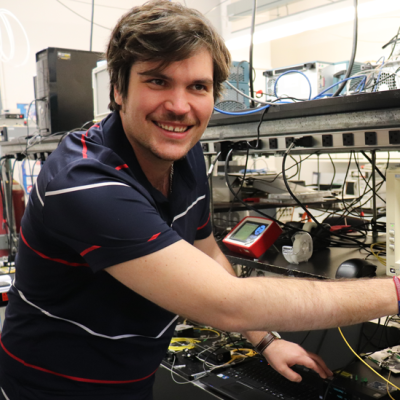Dr. Crockett has expertise in quantum theory, micro-electronics, and materials technologies. His hope is that with his combined backgrounds, he can make UBC, and Canada, a leader in scientific and engineering advancements in quantum technologies.

Research topic
Research Description
The internet has revolutionized our lives, yet an equally or potentially even more transformative network is emerging: the quantum internet. This cutting-edge technology promises unparalleled privacy and security for sensitive communications in government, healthcare, and finance by harnessing the laws of quantum mechanics. Beyond secure communication, the quantum internet could connect quantum computers and sensors, significantly advancing fields such as traffic management, supply chain optimization, drug discovery, battery research, precise GPS navigation, climate change modeling, and even the detection of gravitational waves, deepening our understanding of the universe. Quantum signals, however, are extremely delicate, relying on just a few photons. Their range is severely limited because quantum states cannot be copied without losing their unique properties—such as superposition (the concept of something existing in multiple states simultaneously, like Schrödinger's famous cat analogy) and entanglement (particles instantly influencing each other regardless of distance, termed 'spooky action at a distance').
To address this limitation, there are global efforts for developing the quantum repeaters needed to implement a quantum internet. These repeaters can extend quantum signals by distributing entanglement across multiple points. Current repeater designs face challenges, including unreliable quantum memory and complex technical requirements. To overcome these issues, a new approach that avoids quantum memory is being explored. This design uses multi-photon entanglement in both time and frequency, offering powerful new ways to process quantum information. Using the precision and reliability of silicon photonics, already advanced through electronics manufacturing, we aim to develop the components needed for large-scale quantum circuits towards the generation of multi-photon entangled states, increasing the entanglement resource available compared to typical approaches composed of only two entangled photons. Successful development of such large-scale quantum states in a practical approach would be a major step towards quantum computing and networking for the realization of the quantum internet, unlocking unprecedented capabilities on national and global scales.
Why did you decide to pursue a postdoctoral fellowship at UBC? Did you consider other opportunities?
I believe UBC has unique infrastructure and a collaborative environment where different research groups can contribute to a project where the outcome is greater than the sum of its parts. I think this is especially relevant for advancements in quantum technologies, which requires advanced expertise in quantum theory, photonics, materials technologies, micro-electronics, high-speed electric signal processing, and on-chip photonic circuit development. UBC has world leading expertise in all these fields. Therefore, combined with my background in optical signal processing, I believe there is a unique opportunity at UBC to conduct outstanding research. Ultimately I believe this research opportunity will contribute to ensuring Canada remains at world-wide reference for scientific and engineering advancements in quantum and photonic technologies.
What specifically attracted you to your research group?
I have known Prof. Lukas Chrostowski for his ambition to create and develop useful technologies using state-of-the-art facilities, within a research environment that hones learning and collaborating. Prof Jeff Young has a deep knowledge of advanced scientific concepts for laser and quantum technologies. Together, these groups have shown that they can reliably develop all the components needed for advanced quantum systems, including sources, detectors, and processing sub-systems like modulators, filters, etc. Thus, I believe that UBC is in a unique expertise to develop complex systems needed to address the challenges of developing practical quantum technologies.
What advice do you have for new postdoctoral fellows?
There is a right balance to be found when choosing a research group between taking advantage of the knowledge and expertise I already have while also entering an entirely new field in order to develop new skills and know-how. Since post-doctoral research is also about developing the managerial skills needed to lead a group to bring complex projects to completion, I believe it is also important to find a group that favors a collaborative environment, such as the groups of Prof. Chrostowski and Prof. Young at UBC.
What do you like to do for fun?
My interest for science comes from a deep appreciation for music, so playing piano remains one of my favorite ways to take some time for myself and let my mind roam free. I also like to keep myself physically active and play hockey, as well as cooking for my friends and family.
What is the most enjoyable aspect of your postdoctoral fellowship?
This fellowship will allow me to have the needed support to work with leading experts in Canada and internationally to advance the field of quantum technologies. I think this is a particularly exciting time as we are now able to develop technologies that will have an impact on people lives using concepts that were developed from scientific curiosity.
What does receiving this award mean for your career?
Being awarded the Banting fellowship demonstrates that there is a tangible interest for the development of the technology I am developing. It also shows that experts reviewing the application believe that I have the right background to leverage the expertise and facilities present at UBC to develop disruptive technologies. I believe the impact of the Banting fellowship will stay with me throughout my career, and allow me to develop my network for conducting world-leading research and development.